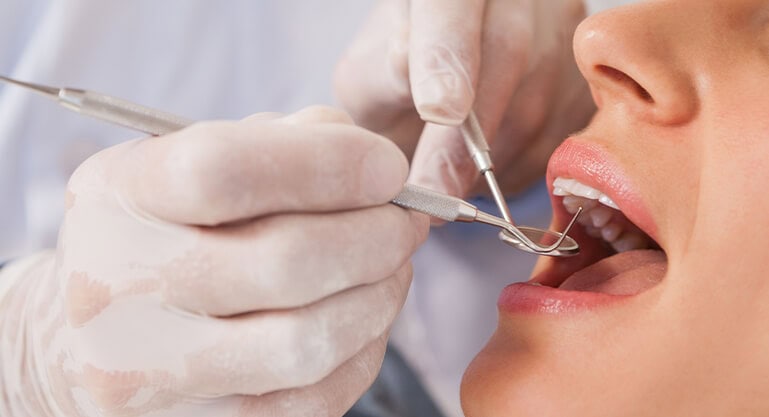Dental crowns are a dental treatment applied to the front surfaces of teeth and are used to correct dental problems such as worn enamel, irregular tooth alignment, gaps, changes in tooth color or cracks.

A dental crown, also known as a dental cap, is a tooth-shaped covering that is placed over a damaged or weakened tooth. It is a common dental restoration used to restore the tooth’s shape, size, strength, and appearance while also improving its overall function. Dental crowns are typically recommended by dentists in various situations, including:

Under these circumstances, dental crown treatment may be considered.

Dental crown treatment is applied in two stages.

Dental aesthetics includes a number of different dental procedures to improve the aesthetic appearance of the teeth and enhance the smile. General steps followed during dental aesthetics:
Dental aesthetic applications can be applied differently depending on the individual’s specific situation and needs. The procedures and process to be applied are determined by the dentist, taking into account the patient’s expectations and health status.

All-ceramic crowns are known for their natural appearance and aesthetic qualities. They are a popular choice for restoring front teeth and enhancing smiles. These crowns are metal-free and blend seamlessly with natural teeth
Metal crowns, including gold and other alloys, are highly durable and have been used in dentistry for many years. They are often placed on back teeth due to their strength and longevity. While not as aesthetically pleasing as all-ceramic crowns, they are functional and reliable.

Zirconia crowns are a type of all-ceramic crown known for their exceptional strength and durability. They are often used for both front and back teeth and are highly resistant to wear and fracture.
PFM crowns combine the strength of a metal core with the natural appearance of porcelain. They are versatile and can be used for both front and back teeth. However, a small metal margin may be visible at the gum line.
Temporary crowns are used as placeholders while a permanent crown is being custom-made in a dental laboratory. They protect the prepared tooth and maintain its function and appearance until the final restoration is ready for placement.

Dental crowns are very useful for a number of reasons:



Getting dental crowns in Turkey can be an attractive option due to the country’s well-developed dental tourism industry. Turkish dental clinics often offer high-quality care at a fraction of the cost compared to many Western countries. Skilled dentists, modern facilities, and competitive pricing make Turkey a popular destination for dental procedures, including dental crowns. Patients can benefit from cost savings while still receiving excellent dental treatment in a welcoming and tourist-friendly environment.

The cost of dental veneers in Turkey can vary depending on factors such as the type of veneer, the location of the dental clinic, and the specific requirements of the patient. In general, dental veneers in Turkey are known to be more affordable compared to many Western countries and often offer significant cost savings. Patients should ensure that they choose a reputable clinic and discuss all costs, including consultation fees and any additional procedures that may be required.
You can contact Esteworld to get detailed information about 2025 dental crown prices in Turkey. Meet Esteworld’s expert dentists and get the smile you want.
Dental crowns are caps placed over damaged or decayed teeth to restore their shape, size, and functionality.
Common materials include porcelain, ceramic, metal, and zirconia, chosen based on durability and aesthetics.
With proper care, dental crowns can last 10-15 years or longer.
Yes, Esteworld provides crowns tailored to match your teeth’s shape and color, ensuring a natural look.
Turkey is renowned for its expert dentists and cost-effective dental crown procedures.
As Esteworld Health Group, Turkey’s leading provider of plastic and aesthetic surgery services, we have been offering aesthetic services at the highest medical standards since 1994 under the slogan “Healthy beauty!”













By Metrobus:
You can get off the Metrobus at Uzunçayır station and then take the minibuses and buses to Metropol Shopping Mall.
Bus Transportation:
You can take buses numbered 8K-10-10A-10EK-13-13ŞB-13AB-14ŞB-16M-19EK-19M-KM46-256 and get off at Ataşehir Plazalar stop.
Transportation by minibus:
You can take Üsküdar-Ferhat Paşa, Üsküdar-Ataşehir, Ümraniye-Ataşehir minibuses and get off at Ataşehir Plazalar stop.
By Metro
You can use the M4 Kadıköy-Sabiha Gökçen metro line and get off at Yenisahra or Kozyatağı stops and then take buses and minibuses to Metropol AVM.
Transportation from Sabiha Gökçen Airport:
You can take the M4 Kadıköy-Sabiha Gökçen metro line and get off at the Kozyatağı stop and then take the minibuses and buses to Ataşehir Metropol AVM.